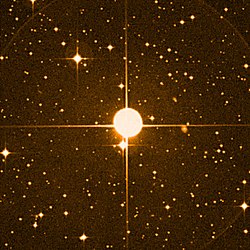astro.wikisort.org - Star
HD 47536 is a single[8] star in the southern constellation of Canis Major. It has an orange hue and is dimly visible to the naked eye with an apparent visual magnitude of +5.25.[2] The star is located at a distance of approximately 401 light years from the Sun based on parallax. It is drifting further away with a radial velocity of 80 km/s.[1]
| Observation data Epoch J2000.0 Equinox J2000.0 | |
|---|---|
| Constellation | Canis Major |
| Right ascension | 06h 37m 47.61830s[1] |
| Declination | −32° 20′ 23.0335″[1] |
| Apparent magnitude (V) | +5.25[2] |
| Characteristics | |
| Evolutionary stage | giant[3] |
| Spectral type | K1 III[4] |
| B−V color index | +1.177±0.002[2] |
| Astrometry | |
| Radial velocity (Rv) | 79.71±0.14[1] km/s |
| Proper motion (μ) | RA: 107.609[1] mas/yr Dec.: 64.667[1] mas/yr |
| Parallax (π) | 8.1335 ± 0.0861 mas[1] |
| Distance | 401 ± 4 ly (123 ± 1 pc) |
| Absolute magnitude (MV) | −0.17±0.15[5] |
| Details[5] | |
| Mass | 0.94±0.06 M☉ |
| Radius | 23.08+0.68 −0.81[1] R☉ |
| Luminosity | 177.2±2.3[1] L☉ |
| Surface gravity (log g) | 1.72±0.08 cgs |
| Temperature | 4,384+79 −64[1] K |
| Metallicity [Fe/H] | −0.68 dex |
| Rotation | 625 days[6] |
| Rotational velocity (v sin i) | 1.93±0.50[3] km/s |
| Age | 9.33±1.88 Gyr |
| Other designations | |
| Database references | |
| SIMBAD | data |
| Extrasolar Planets Encyclopaedia | data |
This is an aging, metal-poor giant star with a stellar classification of K1 III.[4] It is about 9.3 billion years old with 94% of the mass of the Sun. Having exhausted the supply of hydrogen at its core, the star cooled and expanded to 23 times the Sun's radius.[1] The star is spinning slowly, taking 1.71 years to complete its sidereal rotation. It is radiating 177[1] times the luminosity of the Sun from its swollen photosphere at an effective temperature of 4,384 K.[1] As of 2007, at least one planet is known to orbit this star.[9]
Planetary system
Setiawan discovered both planets around the star: HD 47536 b in 2003[10][3] and HD 47536 c in 2007. However, the existence of this second planet is disputed.[9]
| Companion (in order from star) |
Mass | Semimajor axis (AU) |
Orbital period (days) |
Eccentricity | Inclination | Radius |
|---|---|---|---|---|---|---|
| b | ≥4.0±0.4[9] MJ | 1.12±0.005[9] | 434.9±2.6[9] | 0.3±0.1[9] | — | — |
| c (unconfirmed) | >6.98 MJ | 3.72 | 2500 | — | — | — |
See also
- HD 122430
- List of extrasolar planets
References
- Brown, A. G. A.; et al. (Gaia collaboration) (August 2018). "Gaia Data Release 2: Summary of the contents and survey properties". Astronomy & Astrophysics. 616. A1. arXiv:1804.09365. Bibcode:2018A&A...616A...1G. doi:10.1051/0004-6361/201833051. Gaia DR2 record for this source at VizieR.
- Anderson, E.; Francis, Ch. (2012). "XHIP: An extended hipparcos compilation". Astronomy Letters. 38 (5): 331. arXiv:1108.4971. Bibcode:2012AstL...38..331A. doi:10.1134/S1063773712050015. S2CID 119257644.
- Setiawan, J.; et al. (2003). "Evidence of a sub-stellar companion around HD 47536". Astronomy and Astrophysics. 398 (2): L19–L23. Bibcode:2003A&A...398L..19S. doi:10.1051/0004-6361:20021846.
- Houk, Nancy (1979). Michigan catalogue of two-dimensional spectral types for the HD stars. Vol. 3. Ann Arbor, Michigan: Dept. of Astronomy, University of Michigan. Bibcode:1982mcts.book.....H.
- da Silva, L.; et al. (November 2006). "Basic physical parameters of a selected sample of evolved stars". Astronomy and Astrophysics. 458 (2): 609–623. arXiv:astro-ph/0608160. Bibcode:2006A&A...458..609D. doi:10.1051/0004-6361:20065105. S2CID 9341088.
- Setiawan, J.; et al. (July 2004). "Precise radial velocity measurements of G and K giants. Multiple systems and variability trend along the Red Giant Branch". Astronomy and Astrophysics. 421: 241–254. Bibcode:2004A&A...421..241S. doi:10.1051/0004-6361:20041042-1.
- "HD 47536". SIMBAD. Centre de données astronomiques de Strasbourg. Retrieved 2020-01-03.
- Eggleton, P. P.; Tokovinin, A. A. (September 2008). "A catalogue of multiplicity among bright stellar systems". Monthly Notices of the Royal Astronomical Society. 389 (2): 869–879. arXiv:0806.2878. Bibcode:2008MNRAS.389..869E. doi:10.1111/j.1365-2966.2008.13596.x. S2CID 14878976.
- Soto, M. G.; et al. (August 2015). "RAFT - I. Discovery of new planetary candidates and updated orbits from archival FEROS spectra". Monthly Notices of the Royal Astronomical Society. 451 (3): 3131–3144. arXiv:1505.04796. Bibcode:2015MNRAS.451.3131S. doi:10.1093/mnras/stv1144. S2CID 49332927.
- "Distant World in Peril Discovered from La Silla: Giant Exoplanet Orbits Giant Star". ESO for the Public (Press release). Garching, Germany: European Southern Observatory. 22 January 2003. Retrieved 30 December 2012.
External links
На других языках
[de] HD 47536
HD 47536 ist ein 400 Lichtjahre von der Erde entfernter Riese der Spektralklasse K1 mit einer scheinbaren Helligkeit von 5,3 mag. Der Stern wird von mindestens einem substellaren Objekt umrundet, die Bestätigung eines zweiten steht noch aus.- [en] HD 47536
[es] HD 47536
HD 47536 (HR 2447 / HIP 31688) es una estrella en la constelación del Can Mayor, situada cerca del límite con Puppis y Columba, de magnitud aparente +5,26. Se encuentra a 396 años luz del Sistema Solar. En 2003 y 2007 se descubrieron dos planetas extrasolares orbitando alrededor de esta estrella.[ru] HD 47536
HD 47536 — одиночная звезда в созвездии Большого Пса на расстоянии приблизительно 400 световых лет (около 123 парсеков) от Солнца. Видимая звёздная величина звезды — +5,258m[5]. Возраст звезды оценивается как около 9,33 млрд лет[6].Другой контент может иметь иную лицензию. Перед использованием материалов сайта WikiSort.org внимательно изучите правила лицензирования конкретных элементов наполнения сайта.
WikiSort.org - проект по пересортировке и дополнению контента Википедии
